#this turned into a treatise
Text
Terry, Kreese, Johnny, what it means to be a Cobra Kai, 'villainous values' and the love of (evil) karate father for his karate son
I've been thinking about this moment:

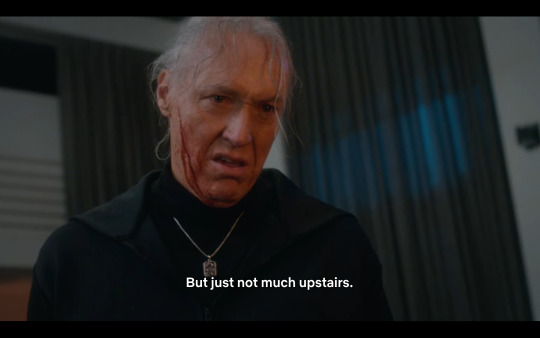
First of all, ouch.
But it also got me thinking....why does Kreese feel so strongly about Johnny?
And as much as his contempt for Lawrence is motivated by jealousy, Terry's inability to see why Kreese believes Johnny is his best student (and why he loves him more than Terry) says so much about the divide in the two men's philosophy, approach and the fundamental values that drive their actions.
(TL;DR: it's his guts and heart, not what's in his head)
Terry and John could not come from more different backgrounds. Kreese was working class and completely self-made. His mentally ill mother's suicide made him a social pariah back home. His motivations for joining the army seem to have been twofold: a way of bettering himself and a genuine sense of patriotism/purpose. I think we can infer he never went to college and he was field promoted to captain. Kreese is naturally courageous, in his best iteration someone who has no fear of death or getting hurt. In his ideal form this courage is rooted in protecting someone (ie when he got his ass kicked helping Betsy.) In its worst form he becomes domineering and controlling of his loved ones, justifying any number of deranged actions as in their best interests.
Terry, meanwhile, came from money and probably was only fighting in Vietnam because his father wanted to "toughen him up" (if he's rich he could have gotten out of it so this is an extrapolation but I think it fits his character.) He even outright tells Tory that he is different from Kreese in this respect: he didn't have to scrape his way through life, but he did learn to use every advantage available to him. He is both intelligent/a survivor and values loyalty even more than Kreese does—you see this in KK3 and in the flashback of Kreese saving his life. He expects that loyalty to be reciprocated (John disappearing on him for thirty years is an obvious betrayal, John caring more about Lawrence is the nail in the coffin.) He admires the qualities Kreese has he doesn't, while secretly chafing against his friend's condescension even as he longs for his attention and approval.
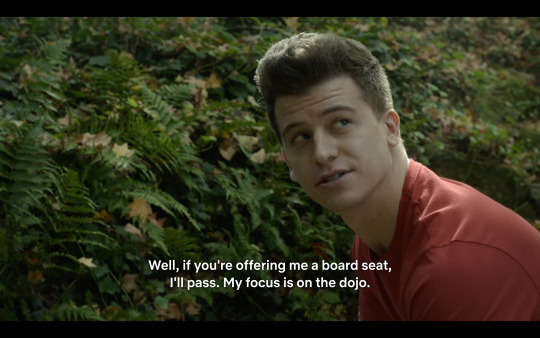
Kreese is unpretentious, has never cared about Terry's money (and has been borderline too proud to take it since Terry was introduced as a character in KK3) while Silver is urbane, cosmopolitan in his outlook—comparatively "forward thinking," an ambitious, big picture guy. Kreese forms deep and personal connections with students that he has "gut" feelings about and sees himself in—as much as he sees Cobra Kai as his baby and legacy, he will only get emotional satisfaction from knowing that someone he personally loves is carrying it on (though he kicked Johnny out in S2, that was only for compromising what Kreese sees as the core 'principles' of CK, and he spent all of S3 trying to get Johnny to come back and S4 focused on grooming Johnny's son to do so in his stead.) For Terry what matters is the actual philosophy and its efficacy at helping weaklings channel their fear and turn it into power (though he's not beyond connecting with a student on a personal level, e.g. Kenny.) The "legacy" is the Cobra Kai "way", carried on by the ubiquitous nature of dominating a global tournament and making dojos, not any one surrogate son figure.
Kreese is a classic macho American archetype, unironically hanging American flags on the dojo walls and going off on political correctness/'snowflakism' while Silver is buying $500K samurai swords and enjoying stolen fine art before pimping merch on instagram. Silver has intellectual pretensions and business sense while Kreese's brain is rooted in animal cunning. These two are very different types of men and villains.
So...why is Johnny 'it' for Kreese but not Terry?

In S3 Kreese tells Robby the story of when he knew Johnny was "the real deal." What impressed him was not that Johnny won a fight, but rather was willing to go all-in against someone way beyond his skill level. Terry is not wrong that Johnny is not the most intelligent character on this show by any stretch of the imagination, which is something that is central to his idea of what a CK student should be, but I don't necessarily think it's central to Kreese's.
Kreese admires guts more than brains, something he does not think Terry has ever or will ever possess.
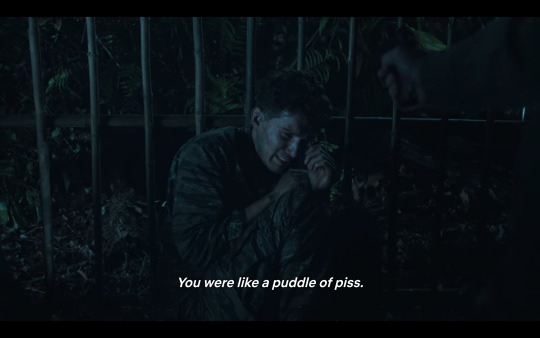
Kreese compared young Silver to Johnny in the prison scene, both scared and fearful—it's clear he views them both as "his", dependents that he "made", relationships his attitude towards has ranged from protective to condescending to controlling at various stages. But the difference is that Terry will always be a follower, a number two, whereas, at least in his own mind, Johnny is a true heir apparent, someone who he can project his own legacy onto.

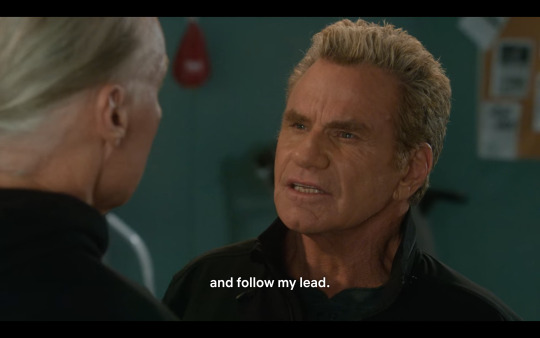
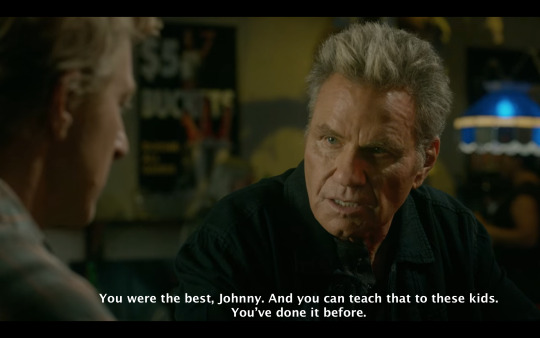
He cares for Terry, in his own twisted way, but there's a fundamental lack of respect. Certainly he often treats Johnny like a child, but he's also his karate son that he believes sincerely is the best and who was "robbed" of his chance by Daniel in '84. Johnny is an extension of himself in his mind, someone who has the potential to carry on the legacy and philosophy he created, which is the thing he cares about most. He really, sincerely believes it helps children, that it helped Johnny.
By his own admission, he wanted Johnny to be better than him.
And he is—in spite of Kreese, not because of him.
Nothing exemplifies this more than the parallel of the S3 finale Vietnam and S5 finale fight. Contrast this:
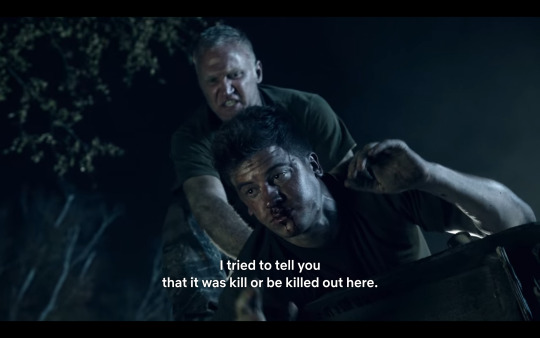

With this:
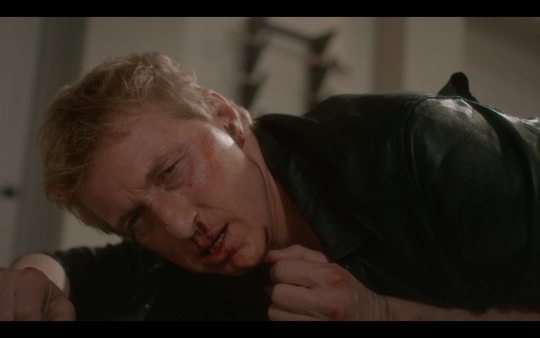
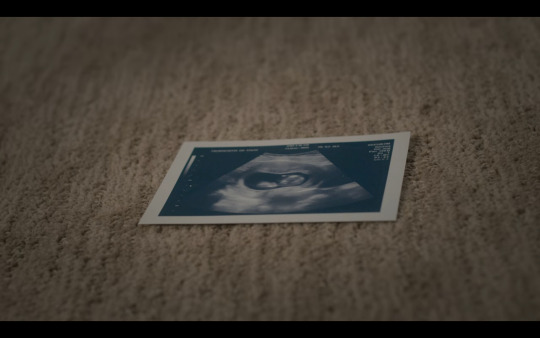
The loss of Betsy (the metaphoric shedding of his humanity) gave Kreese the motivation to let go of all moral questions ("No mercy!") and the strength to kill Captain Turner, whereas the hope of his family, his children and need to live the rest of his life protecting and caring for them—the most primal human urge, embracing his humanity—is what gives Johnny the strength to keep fighting against all odds, people with greater strength and technical ability than him.
Sound familiar?


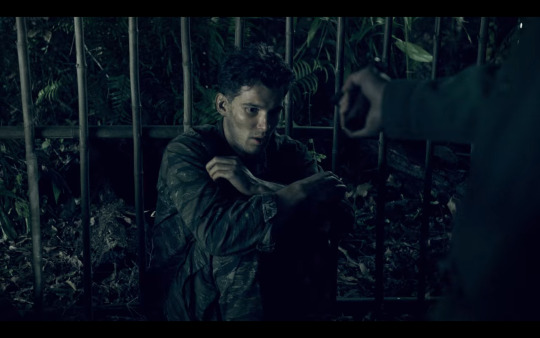

Johnny has become the man Kreese might've been, he has the same core values, heart and guts, as the man still buried deep within him.

At some primal, deep and subconscious level Kreese sees his own best self in Johnny, even if he doesn't understand that it was through rejecting the worst of what Kreese gave him—learning from his mentor's mistakes—that has made him a better man.
That's the tragic irony.
Well, that and the fact that Kreese can only get the emotional satisfaction of Johnny understanding what he tried to do in therapeutic hallucination form.
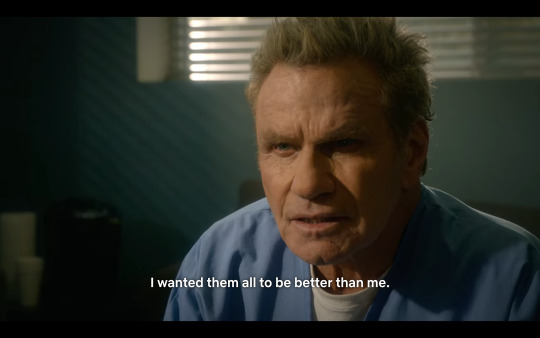

#cobra kai#cobra kai spoilers#johnny lawrence#john kreese#terry silver#cobra kai meta#this essay started one way and ended up a love letter to kreese's effed up love for johnny#martin kove#william zabka#thomas ian griffith#this turned into a treatise
115 notes
·
View notes
Text
i brought him over with me, you know. we sailed together under avery when we was kids. he was my first bunkmate. and for years, he went on how he'd got this huge stash, hidden away. and i should live to survive him, because one day, i will be a rich man. but as you know...we lost him on the pembroke. so i open his locker and what do i find? twelve pesos. a busted pocket watch. and a letter with instructions to deliver it to his sister in new york. lying sack of shit! was mister craig. so: i bought the boys a round with the pesos, traded the pocket watch for a bit of tail, and spent two weeks that winter in new york trying to deliver that fucking letter to his sister. looked high and low. never found her. so on the way home, i waited until we were in open water and i could see no land in any direction. and i dropped it over the side. returned to the sea...there are no legacies in this life, are there? no monuments. no...history. just the water. it pays us, and then it claims us. swallows us whole. if you EVEN care
#one of the speeches of the show for me#i mean it's the monologue show and they're all pretty good but this is one of the lesser monologues#not a high political treatise or a truth about love or whatever#just an old guy reminiscing about a dead guy with a man he imagines will soon also be dead#i always forget until i get to it that the Craig Drinks Piss story turns into Grieving Dad's Sadtime Storyhour#so it always hits me exactly like it's new#black sails#q
249 notes
·
View notes
Text
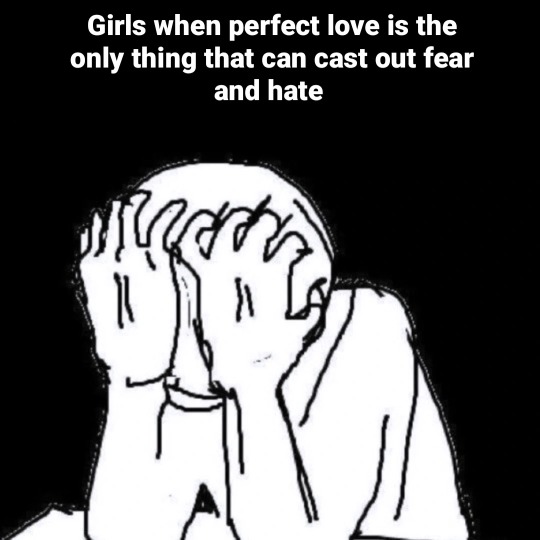
#took “pray for your enemies” too seriously and my brain is being rewired#incoming treatise on non affirming churches#cops#and the traps progressive christians fall into#humility abd humbleness are like the only ways to great people we disagree with#turning the other cheek is a radical action actually#and not an advocation for repression#perfect love#christianity
89 notes
·
View notes
Text
If you take nothing else from me yelling about gender. Please take away that categorizing men as the 'predator gender' and women as the 'victim gender' (yes, even if it's trans men/trans women and not cis) is at best gender essentialism and at worst giving bad men a free card because 'men are like that, they can't help it' and gives a cover for bad women to enact abuse and violence of their own under the cover of being 'the good guys'. You do not have to like patriarchy or trust strange men, just understand that someone being a woman does not preclude them from being a predatory puppet of patriarchy and someone being a man does not preclude them from being trustworthy and safe.
#spitblaze says things#along with OTHER shit#that i dont have the brain for bc im just some guy on the internet and not a gender scholar#very cool how ppl will find posts of you Complaining about gender shit and question you as if you wrote an entire treatise#instead of like three to six sentences on your blog bellyaching about how othered u feel as a trans dude in otherwise very feminine spaces#edit. further proof im just Some Guy#turns out ive been using 'preclude' wrong this whole time#so. i fixed it
29 notes
·
View notes
Text
One must imagine the winged lion happy...
#dungeon meshi#s#just finished it. still cant believe it turned into an existentialist philosophy treatise. im in love
11 notes
·
View notes
Note
Hi bestie! Any silly funny headcanons about buddie you wanna share with us?
hiiii beloved! and oh boy do i!
okay so their first date is a DISASTER. they both don't really know how to make the transition to romance, and even though they are so comfortable with one another, they are absolute nervous wrecks especially when it comes to the first date.
buck researches endlessly for the best restaurant, picking something a little fancier than either of them usually frequent, and drive eddie a little crazy with all his messages about the place and food buy hey its endearing too. eddie loses his mind over what to wear and enlists may's and linda's help to pick out a suit.
buck gets eddie flowers but on his way to eddie's door he trips and falls and crushes them so he quickly throws them to the side and acts like he never got any (eddie finds them later and teases buck relentlessly about it).
they end up being late for their reservation and have to wait a while in awkward silence and when they are seated the silence continues and buck is so fucking flushed and jittery and eddie is just unsure and locked up bc he doesn't wanna fuck this up but he doesn't know how to do this one thing with buck. the food is okay but nothing to write home about and when buck drives them home he laments about how shitty the date was which makes eddie laugh and they talk about why they are nervous and what they should do next that would be more them
sleepover weekend
#asdfghjkl sorry this was NOT supposed to turn into a treatise on their first date#and i guess technically its only one (long) headcanon but yknow hope you like it haha#ryan gets mail#buddie#911#rae 🦈
18 notes
·
View notes
Text
TL;DR
Nobody: ....
Me: So Benji Mahmoud could have been an incredibly important and dynamic character, with relevant ties to multiple themes Prince Lestat did a good job pulling on. I would have been real happy to have seen more of his character and, since I didn't, I guess I'll settle for writing about it here.
Hyperlinks go to the posts I thought of as I wrote this.
I've been feeling pulled to post a lot of head canons that involve Benji lately and I think I'm starting to kinda stumble across why it all of a sudden feels important to me.
Like a lot of things in this fandom, it actually starts with Daniel.
Daniel is the only character we see in the original TVC trilogy, in real time, being human and then being brought into the blood. He's just Some Guy who happens to start all this shit that blows out 13 books. And that's relatable. Most series have that character through which the reader comes into the world of the story. It's an established narrative technique.
And then we get the final TVC trilogy, the three books we never thought we'd get because Anne kinda finished the series a decade before and went on to bigger and better things.
*cough* not *cough*
So we get the final trilogy. In which we are introduced to a blond, male character, human when we meet him but, oh no, he gets involved with vampires and ultimately ends up begging to be turned, then spends the rest of the series as a vampire.
Stop me if you've heard this story before.
Now I've got nothing against Viktor. His romance with Rose seems sweet, and he's always going to have a bit of the centre stage just because he's the literal genetic clone of our main protagonist, Lestat. It's a bit hokey but, you know, so is a lot of what we ended up with in the later books. We're just grateful it didn't all end with Blood Canticle and now weed out the things we like.
It's just... I can't help thinking an existing youthful vampire from TVC would have given deeper resonance to the story than introducing a new character with a similar trajectory did.
What might the last trilogy might have been like if Benji—the third human-turned-vampire we meet between these two characters—had been just a little bit more utilised. Not as a love interest, or a plot point, but for himself. Cause just his placement in time and circumstance offers a lot of narrative potential.
We first meet Benji Mahmoud as an important character in Armand's recovery after he attempts suicide. He asks to be made into a vampire, but isn't obsessed by it, pretty much accepts it and moves on when Armand tells him it can't be done. ("Oh, never. I don't have such a power. It's never done." "Then who made you?" "I was born out of a black egg." - TVA)
There's a lot of a sense that he and his companion Sybelle are replacements to a writer who no longer wished to write about Daniel in Armand's emotional trajectory, and I know that put me off both these characters for years. But the side effect is, we get a continuity to show Armand doesn't just stop after Daniel walks out on him, and can choose to read that Armand was hurting and traumatised when recounting these events to David.
Back to Benji. When Benji is turned, he is 12 years old and it's the end of 1998. There's a reason I like both of these things: 12 years old is just about the youngest I've heard any us fans picking up the TVC series of books (omg that's way too young for this content, my friends, I mourn all our brain chemistry), and the birth year of 1986 makes Benji not just a millennial, but lot closer in age and experience to a lot of us than the far off birth year of 1952 for Daniel-the-Baby-Boomer. I also think it would have been a lot easier to remember to read Daniel as not a millennial had there been another character front and centre who was.
The way I see it, Benji could have added so much nuance as a character of TVC if he'd been fleshed out. Most of the time if I remember to think of Benji in canon, he seems like the faded middle child, a plot point with a name in Prince Lestat, nothing resembling a fully fleshed out character.
And that makes me sad. Sad for his character, and sad for us. I'm not saying get rid of Viktor, don't get me wrong, I'm just saying that in a cast of 183282 vampires, there was surely enough room to do more with Benji than give him a radio show recorded within the walls of Trinity Gate.
Like, just off the top of my head: Did he ever leave those walls? Was he still as much of a smart ass with a commentary on everything after 20 years in the blood? What did he figure out that he liked to do with his time when he wasn't recording? Did he remain close to Sybelle? How did he feel about forever holding the visage of a 12 year old? What kind of evil doers did he hunt? What was his relationship with Armand? What did he think of Daniel? Was it a bit awkward coming face to face with his maker, Marius, after so long? Was he included with the guys whenever Armand, Lestat and Louis caught up? Is he more like Daniel at court, really fitting in more amongst the more ancient characters, or does he prefer coming across as one of the wiser young ones when he visits Auvergne?
Hell, if Viktor is basically Lestat's son and Benji is kinda Armand's son, what do the interactions of that Next Generation look like??
Conversely, what were Armand's thoughts beyond the immediate aftermath of Benji and Sybelle having been brought into the blood? Did he lose interest in Benji after Marius turned him? Was he protective of him? Were there times when he looked at Benji and felt woefully guilty about Claudia who died for the offence of being a child vampire? Was Benji a way for Armand to heal the mistakes he had made with both Claudia and Daniel in different ways before him? Louis and Benji live in the same house for at least 10 years together; what were their interactions like and did Armand have any thoughts on those?
#can i have a round of applause for#benji mahmoud#because apparently today I am stuck on minor character love#and a treatise of the humans we see turned into vampires during the course of the chronicles#the vampire armand#trinity gate#prince lestat#the devil's minion#daniel molloy#viktor de lioncourt#vc shitpost#nik re-reads TVC
34 notes
·
View notes
Text
“...you don’t just want to be a father to protect this kid, right?”
Roy feels like shit saying it, but someone has to and Keeley seems slightly uncomfortable talking about the whole thing. So he brings it up during private training, just him and Jamie.
(R/K/J, past Jamie/Bex, Jamie might be Bex’s daughter’s father.)
#ted lasso#fic#jamie tartt#this started as a funny idea and turned into a treatise on divergent feelings about parenthood in relationships
2 notes
·
View notes
Text
would it be unhinged if i said the only way i'll be compliant with hope turning lizzie into a heretic is if i'm writing hi.zzie??
#rn sebastian turns lizzie because i like heretic! lizzie but hate the last few seasons of leggy#but im OBSESSED with lizzie being turned by someone she's romantically involved with#*[ OOC ] . . . a treatise on the effects of caffeine
2 notes
·
View notes
Text
🚨🚨🚨🚨 MY INCREDIBLE BUTCH LESBIAN COWORKER JUST ADMITTED THEY MAKE FANVIDS IN AN ALL STAFF MEETING THIS IS NOT A DRILL 🚨🚨🚨🚨
#work.hell#i LOVE them what fucking royalty holy shit#and not to turn this into a treatise about fanworks but. if my incredible coworker makes fanvids loves it and is proud of it#then you can too!! at any age!!
10 notes
·
View notes
Text
I’ve come to really appreciate how much old-soulfulness theres ended up being in my generation. Especially after having lived through the internet-irony age where everything was more or less framed as a joke, it’s really nice to have such a sense of genuineness among people. Something about how people have such an interest in taking in nature, enjoying the small parts of life, being friends, it’s one of the few things that gives me some hope for where humans are going. I’m sure a lot of people find some hypocrisy in that it’s the very generation that has fully embraced social media and phones that I think has this genuineness, and I’m sure they’re right in some regard, but this might actually be somewhat of a source? Something about how everything now feels so superficial has probably contributed to people longing more and more for something simpler, at least I think so. There’s certainly something very appealing about the idea of waking up on a cool summer morning, spending the day picking wildflowers, no cares in the world. To avoid getting too rambly, embrace your nature and weirdness and love and camaraderie and soul
#Bagger shower thought turned Bagger shower treatise#if anyone wants to pick wildflowers with me let me know#this was probably rooted in watching Totoro#such a love of nature and whimsy and joy
3 notes
·
View notes
Note
🔥
(I am too tired to think of a topic. Ummm…shipping)
I just think that if you get super mad over it you should maybe log off for a while
send me 🔥for a hot take
#idk what counts as Controversial take on shipping in 2022 but i think it's just. very silly of us! in a fun way#but the moment i start seeing treatises on the morality of X and evil of Y i turn into the old man who yells at the cloud#i tried really hard to ship reylo back when everyone hated it because I wanted to live my life in spite#but it wasn't messed up enough and it was so boring for the level of drama it caused#that was the most involved I've been in shipping hot take bar the time I got cancelled on twitter for writing selfcest
4 notes
·
View notes
Text
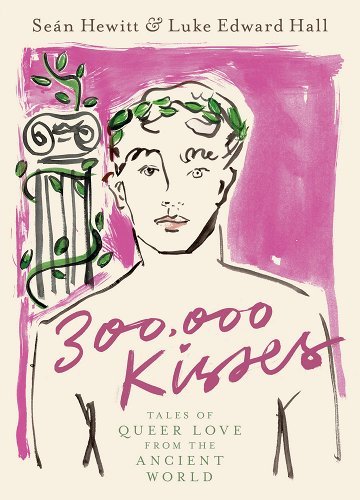
300,000 Kisses: Tales of Queer Love from the Ancient World
Seán Hewitt (Author) Luke Edward Hall (Author)
A landmark illustrated anthology of queer Greek and Roman love stories that reclaim and celebrate homosexual love and sensuality, from artist Luke Edward Hall and award-winning poet Seán Hewitt.
For centuries, evidence of queer love in the ancient world has either been ignored or suppressed. Even today, only a few narratives are widely known: the wild romance of Achilles and Patroclus; the yearning love of Sappho's lyrics; and the three genders introduced in
Plato's Symposium. Yet there is a rich literary tradition of queer Greek and Roman love that extends far beyond the prudish translations of these familiar handful of stories. In 300,000 Kisses, award-winning poet Seán Hewitt and renowned designer Luke Edward Hall collect these stories--including some of the most beautiful and moving in the classical canon--and bring them to vivid life. Alongside celebrated works by Homer, Sappho, Ovid and Catullus, they include a wide range of rarely anthologized sources: raunchy poems, thoughtful dialogues, philosophical treatises, and even a graffiti text salvaged from the ruins of Pompeii. Through Hewitt's contemporary translations and Hall's vibrant illustrations, we encounter relationships that are by turns heartfelt and nourishing, unrequited and lustful, toxic and crude, tender and fulfilling. A groundbreaking anthology that seeks to change the way we see the ancient world, 300,000 Kisses is a fascinating journey through love in all its forms.
(Affiliate link above)
#queer history#queer#lgbt#lgbt history#gay history#lesbian history#transgender history#transgender#making queer history#queer books#lgbt books
642 notes
·
View notes
Text
Okay, this is 1600 words of (positive!) meta regarding the OFMD finale. Included is character analysis and a treatise on why a certain trope people keep throwing around does not apply here.
This is of course just my take, and I'm sure people will disagree, but I needed to get this out. Apologies if it comes off disjointed, I've had like no sleep.
Spoilers within, obviously. You have been warned. Heed the tags. I didn't tag any characters because I consider it a spoiler, but you know who this is about.
Listen. Listen.
Let me start off by saying I have been where you are. I’ve had beloved characters die, either because it was important to the narrative or for shock value. I’ve been there, so I’m not coming at this without empathy. I’m not an Izzy hater. I loved him as a character. I’m truly sad to see him go.
But from what I’m seeing around Twitter and tumblr, some of you do not understand the role of an antagonist in a story.
Izzy was always meant to die. The moment he said, in the first season, “the only retirement we get is death,” I knew he was meant to die in the end. The foreshadowing ran through both seasons. Izzy was the true antagonist of S1. He was there to keep Blackbeard tethered when he started pulling away, and yet he also set the plot in motion. He inadvertently introduced Blackbeard to the person who let him be just Ed. He put Ed on his own path to redemption without even knowing it.
S1 ended with Izzy getting what he wanted as Ed lost everything he had. S2 was about Izzy coming to terms with the fact that he’d gone too far, he’d turned Ed into a monster. It wasn’t what he wanted. He wanted Blackbeard back, just like old times. Instead, he got the Kraken, and it was more than he bargained for.
Especially after it cost him his leg and he realized how far gone Ed really was. The conversation that ended with Izzy’s half-assed suicide attempt was the final blow to Izzy—Ed really didn’t seem to care anymore. Where Izzy wanted him to stop giving a shit about his silly boyfriend, he instead got a Blackbeard who didn’t care about anything, and he was apparently now included in that category.
(I said half-assed suicide attempt because Izzy wasn’t meant to die then, THAT would have been an empty, pointless death. It wouldn’t have taught Ed anything—in fact, all it did was make him more self-destructive, which was Izzy’s purpose to the narrative, but not his endgame. That Ed thought Izzy killed himself pushed Ed to the brink. Ed wanted to die and take every scrap of Blackbeard with him. Had Izzy successfully killed himself, Ed and the Revenge would be at the bottom of the ocean.
It wasn’t until the crew left Izzy the unicorn leg that he realized the power of compassion, the incredible act of grace from a crew that suffered so much from Izzy’s own machinations and didn't need to forgive him. It moved him to tears, and it moved him to accept that maybe it wasn’t such a bad idea to let people in, to let himself be cared for. It was a foreign concept and something Izzy likely hadn’t experienced since losing his family (I fully expect a shit ton of fanfic of Izzy’s life before piracy).
Israel Hands found the capacity to let love all the way in and by god, did he pursue it.
But, again, Izzy was always meant to die, and I’m glad they stuck to the narrative they set out with instead of placating fandom and letting our influence dictate how they told this story That’s never good, trust me. Fandom should not influence a creator’s decisions regarding their own characters. It rarely if ever ends well.
[Stares in Voltron S8]
And I see a lot of people out here throwing the “bury your gays” phrase around—I beg you, please look up the definition of the trope. Izzy didn’t die because he was queer, he didn’t die because of his disability. He wasn’t one half of the only queer couple in the show fridged for shock value. He wasn’t killed off due to pressure from conservative viewers. He wasn’t the only queer, disabled character.
They didn’t kill off Lucius, or Jackie, or Wee John. Would you be as outraged if it was any of them?
Killing Eve is bury your gays. Supernatural is bury your gays. Pretty much any film, book, TV show, whatever, where a queer character dies because they’re queer, of AIDs, to further the narrative for a straight person, etc—that is burying your gays.
Izzy’s death was none of those things. Izzy’s death had meaning.
Izzy’s death freed Ed from the Blackbeard persona. It finally forced Izzy to say the things he couldn’t say until he realized it was his last chance. Izzy was also tired. I honestly think he stuck it out for Ed’s sake, because he was afraid to let Blackbeard go without making sure Ed would be ok.
He loved the idea of Blackbeard, but over time, he learned to love Ed. He finally understood what Ed tried to tell him the whole time.
“Fuck off, you twat. You’re surrounded by family.”
You’re safe. You’re loved. You don’t need me anymore. You don’t need to be reminded of who you’re capable of being, you need the people who will guide you to who you will become, and I’m not one of them.
I know a lot of Izzy fans are stung by his death, some of you are deeply upset. I get that. Like I said, I’ve been there. Sirius’s death made me throw that fucking book across the room. That Fucking Woman™ killed off my entire OTP, purely for shock value and, imho, a direct response to shippers. Trust me, I have felt betrayed by a creator for their decisions.
But I need you to understand that no, this was not a personal attack, this was not malicious, this was not “bury your gays." A show that celebrates queerness and diversity is not suddenly homophobic and ableist because your favorite character died and happened to be both of those things. But when the majority of your cast of characters is different in some way, and they’re in a show about 18th century pirates, you have to accept that one of them could, in fact, die. “Anyone Can Die” is also a trope and the more accurate one to describe E8.
If only being queer and disabled made you invincible.
Spoiler alert: it doesn’t.
And no, I’m not an Izzy hater. I loved him, I loved him as an antagonist, and I loved his redemption arc. He was fascinating and Con put his whole O’Nussy into that part. I’m sorry to see him go, but as a mystery writer who often has to kill off beloved characters, I understand that he served the purpose he had from the beginning.
I swear, if some of you had your way, there’d be no conflict at all in any form of media. This what a steady diet of nothing but fanfic gets you. This is not a fluffy one-shot with magical healing dick and a happy ending where everyone sails off into the sunset. If that’s what you wanted, what you headcanoned, you did this to yourself. It’s not David et al’s fault that we took that character and babygirled him. That’s the risk we take when we decide to love a specific character, when we take a genuinely terrible person (in S1) and woobify him.
So, please stop harassing and attacking David, Alex, et al. David did not and should not change his story to placate us. The fact he went ahead with it despite the backlash I’m sure he expected makes me respect him as a creator even more.
Anyway, I’m going to revel that we have three (!) queer relationships with happy endings where one or both didn’t immediately die (again, the actual definition of “bury your gays”) and that we got at least two seasons of a little show that celebrated individualism, diversity, queerness, compassion, and love.
In the end, it all came down to love.
“There he is.”
Goodbye, Blackbeard.
Hello, Ed.
#ofmd spoilers#ofmd season two spoilers#ofmd finale spoilers#ofmd finale#Meta#ofmd s2 spoilers#our flag means death
786 notes
·
View notes
Text
ok, i did barbenheimer, so here are some assorted thoughts about both films (i am discussing potential "spoilers" for both, so look away if you don't want these):
on paper, and in experience, this is the wildest double feature to do. barbie and oppenheimer could not be two more different films, in terms of tone, aesthetic, and themes; on the one hand, you have a treatise on feminism in the guise of one of the most widely known decades-old ip, and on the other, you have a complicated biopic about the complicated figure who developed the atomic bomb.
and yet, there is a heart and soul linking these two films, and i actually think seeing them in the double feature makes them work: it's care and craftsmanship. these are two films made by people who actually care about cinema as an artform, and it's such a breath of fresh air compared to a lot of the dreck we've been getting out of major studios and wide releases, especially over the past decade.
barbie is not an independent film; you guys are silly, and you need to get that out of your heads. mattell's name is literally on it lol BUT. what this story turns out to be is something pretty unique in terms of today's cinematic landscape. it's a thoughtful treatise on feminism and gender roles on all sides of the equation — the unrealistic expectations put on women, the emptiness that drives men into upholding patriarchy, the absolute absurdity it is on all counts to let ourselves be consumed by this instead of getting to be ourselves and figure out who we actually are. loved every second of it.
also: "i lost interest in patriarchy when i learned it wasn't about horses", like, line of the year.
oppenheimer manages to distinguish itself from the sludge of oscar bait biopics, because, well, because of the craftsmanship of christopher nolan, but also because, in particular, it has such strong thematic focus. it is both a story about oppenheimer, the complicated figure who unleashed something terrible on the world, and the story of the plight of the scientist; just because you can do something, does it mean you should? when you put a dangerous tool into someone else's hands, is it their hands who have the responsibility for how it's used, or is it you, for creating it in the first place?
these are questions that i think the film wrestles with very adeptly, and it doesn't provide easy answers — because there are none. oppenheimer himself spent the remainder of his life wrestling with his own complicated legacy, and the film really captures the spirit of that. the final shot really makes that stick.
both of these films had clear vision for what they wanted to say, clear care and craftsmanship involved, and as someone who genuinely loves cinema and has felt so disheartened seeing shit upon shit being flung into theaters in wide release, i deeply appreciate both of these films, and i don't regret the experience of doing the double feature, because it was really something special — even if, whew, i'm going to need about five business days to process all of this.
502 notes
·
View notes
Text
London, Soho, AZ Fell’s Bookshop, 1941
“That’s the trouble with you lot, you tend to see things in black and white. Sometimes, you just gotta blur the edges.”
“Well, maybe there is something to be said for… shades of gray?”
Their glasses clinked.
“Well, shades of dark gray,” Crowley corrected, and the ease crept back into their conversation along with the little correction, leaving the emotional vulnerability under the table, where the photograph rested on Aziraphale's thigh.
“Shades of a very light gray, I rather fancy.” Aziraphale smiled into his glass, preparing for their disagreement to turn into a full-blown silly discussion on color theory. Which it did.
While their aesthetic discrepancies about various shades of gray were being discussed at length and in oral treatises, the angel and the demon were very much on the same page when it came to wine, and the drinking of it. They had not over-indulged, not tonight, but were emptying the bottle between them slowly and comfortably, having settled into a conversation of the same kind. The virtues of mixing colors, all that. It came to them easily, the debating, each fending for the role they had been assigned.
“Of course, take too many colors and you just end up with a sort of brown-gray sludge,” Crowley said now, and made a face. “Bit like the walls of hell.”
This was the wrong term to drop so carelessly, on a night such as this, and the lapis-lazuli dreams of Aziraphale’s mind were washed right down the drain, where they traveled until they turned into a sort of brown-gray sludge and dripped onto the road to hell, which matched the walls in color. Hell, where Crowley had almost ended up tonight, and not to pay a friendly visit with a report card.
“Crowley, what would have… If they’d taken the photograph, what would have happened to you?”
Aziraphale had turned the page and stumbled upon a new chapter of their conversation, pricking himself on the safety pin that kept the messy draft of the novel of Them all in one tidy place. This was uncharted territory, both of their relationship and of his heart. Aziraphale really, really terribly loved a good story with a happy ending. Shame if it were to be cut short, finished before its time. But where was it headed? The proof was in the pudding. (A good kind of sludge, with a more pleasant color.) There were no instructions, not on the pudding box and not in the first and second and hundredth drafts of their millions of stories. Aziraphale was scared, he realized, of the open-endedness.
He looked nervously at Crowley, for a moment, before his eyes flitted away.
“Eehhhh,” Crowley said. “Eh. Dunno. Y'know. Bad stuff. Good at that , they are.”
Crowley wouldn’t answer him, Aziraphale realized. At least not properly. The demon began blubbering away now, about the creativity of hell, trying to work his way back to the topic of colors along the sludgy walls of hell and likely succeeding, but Aziraphale wasn’t really listening anymore.
Aziraphale didn’t say he was scared. He even tried not to show it. He’d shown too much, already, tonight. And look where it had gotten them, all this emotion. They were safe now, yes, but Crowley had risked too much for him today – and too many other days and nights, as well. It was all his fault. And he kept doing it, too, purposely even, sometimes (though not tonight) and it was so terribly selfish of him.
Crowley’s safety was more important to him than anything else.
And he was its biggest threat.
They couldn’t keep doing this. Not after tonight. Not after Crowley had tread on hallowed ground for his sake; after Crowley had held a gun to his face, shaking, pleading no; after Crowley had almost gotten dragged down to hell for trusting an angel. Not after Aziraphale had realized that he– how much Crowley meant to him, and how much losing him would tear a hole into the very fabric of his being. Not the loss of his corporation – though that was its own kind of terror and a cause of many past nightmares – but the loss of him, Crowley, his very being. No more Crowley ever again, not in this body or any next. The thought had been so terrifying he'd rejected it immediately, and shut it away, but it was back now, a monster not constrained by drawers or cages of the mind. He'd realized there was no Aziraphale without Crowley, not really. And he couldn’t imagine it. But to keep him safe, to truly keep him safe–
“It’s getting awfully late. Maybe you should leave, now.”
–he needed to stay away.
“Eh?”
“I said it’s late, and I’m ti– tired… and– you should probably leave. We’ve spent– too much time together, today, have we not?” He tried to laugh, nervously, and Crowley furrowed his brows.
He got up anyway, abruptly and a little stiffly. “If that’s what you want, angel.”
It’s not what I want at all. “Yes.”
Aziraphale got up, as well, pushing his chair into the table and following Crowley to the door. The demon was walking briskly, but stopped short before reaching the exit. Aziraphale came up to his side, looking torn, and lifted a hand as if to hold him. He, too, stopped short before making contact. Let it drop.
“Angel,” Crowley started, but obviously didn’t know where to go with the words. What’s going on? The sudden change had thrown him off, and yet he was beginning to realize, slowly, what might have caused it. The worry in Aziraphale’s eyes was telling.
“I can’t have you risking your life for me,” Aziraphale said now, very quietly.
Crowley exhaled through his nostrils. We’ve both been risking our lives for each other for a very long time , he wanted to say. Wonder why that is? He said nothing. He didn’t want to think about the answer to that question, either.
Aziraphale looked at him, and there was something in that look, in that god-unforsaken gaze , that tore at Crowley’s insides, and he leaned forward: just a bit. And Aziraphale didn’t draw back. They stayed like that for a moment entirely too long for it to mean anything but one thing, but neither closed what little distance remained between them.
It was Crowley who turned away.
“Good night, angel,” he murmured, and Aziraphale only registered the sound of the little door bell as the Bentley was already roaring to life.
He stood there, alone, for several more moments, grappling with what had not happened, before he returned to the back room, where the photograph lay on the table, mocking him and his silly little human feelings. He didn’t want to look at it.
He should destroy it. Wasn’t that the right thing? The only thing? But Crowley’s absence hurt (already, already it hurt) and... what if he followed through and kept him at an arm’s length? What if nights like these were no longer possible? At least not until things had cooled down, one way or another. A few decades, maybe.
But he couldn't do it. Couldn’t bear it.
He pocketed the picture, carefully, in his waist coat. He suddenly felt like crying. Instead, he wandered into the shop, sat down at his desk, and opened a book. Paradise Lost. How wonderfully ironic.
He kept reading until dusk, and longer still, and when the little bell chimed again, announcing a brave and forlorn customer, Aziraphale slid the photograph between the pages, and closed the book, and got up with a smile.
#good omens#ineffable husbands#good omens fanfiction#my tiny take on 1941#(this is part of the new chapter of Meanwhile but posting it as a standalone too)#my writing#inefficable
288 notes
·
View notes